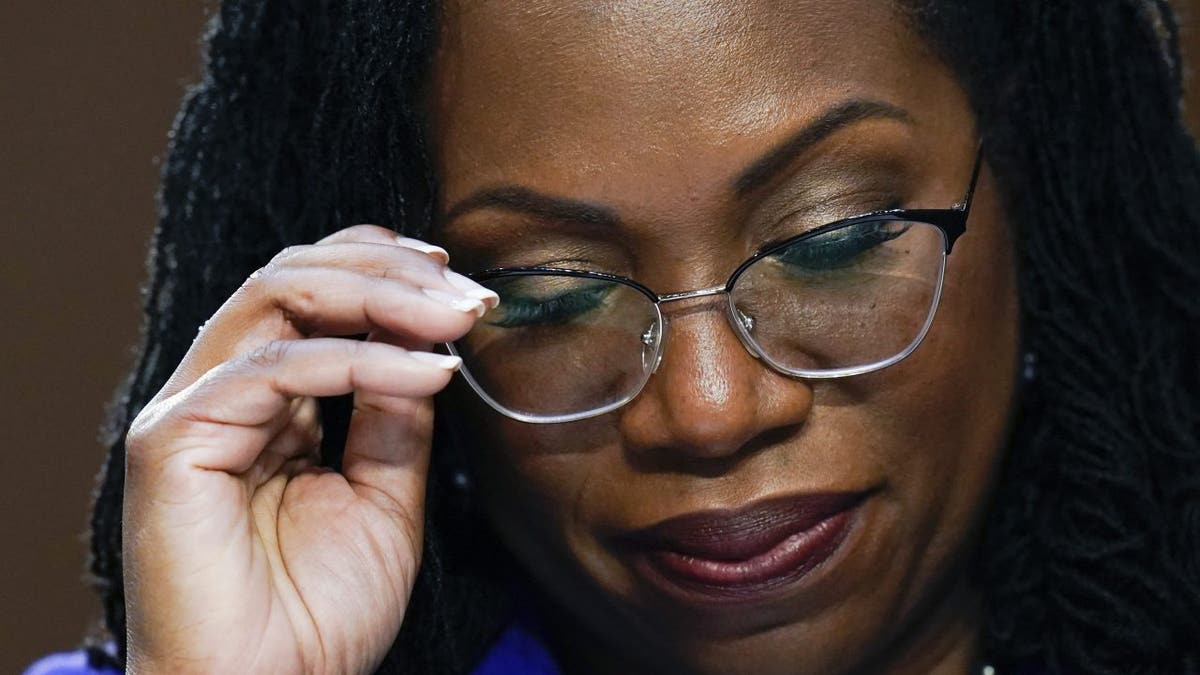Turley: Judge Jackson will do ‘quite well’ in the confirmation hearings
George Washington University Law Professor Jonathan Turley reacts to Sen. Josh Hawley probing Ketanji Brown Jackson’s sentencing record.
"In passing on this nomination to the Supreme Court, we must also pass judgment on whether or not your particular philosophy is an appropriate one at this time in our history." Those words in 1987 were a game changer in American confirmations when Democratic senators opposed the Supreme Court nomination of Judge Robert Bork by President Ronald Reagan.
While the Senate had long maintained that a qualified nominee would be confirmed despite his judicial philosophy, that changed with Bork. The man who uttered those words was the senator from Delaware: Joe Biden.

Supreme Court nominee Ketanji Brown Jackson departs with her husband Dr. Patrick Jackson, left, after the first day of her Senate Judiciary Committee confirmation hearing on Capitol Hill in Washington, Monday, March 21, 2022. (AP Photo/J. Scott Applewhite, Pool)
Biden has now made his first nomination as president. Democrats insisted, in the words of Rep. Jim Clyburn, Judge Ketanji Brown Jackson's confirmation must be "beyond politics."
That has not been the position of the Democrats since Bork and certainly not in the last three nominations. Indeed, many Democrats went public with the nomination of Amy Coney Barrett that they would vote against her entirely on her conservative approach to constitutional and statutory interpretation.
The question is whether these hearings will clearly establish the judicial philosophy of Jackson.

Supreme Court nominee Judge Ketanji Brown Jackson speaks during her confirmation hearing before the Senate Judiciary Committee Monday, March 21, 2022, on Capitol Hill in Washington. (AP Photo/Jacquelyn Martin)
In her opening statement, Jackson discussed her past decisions and stressed "I believe in transparency. That people should know precisely what I think and the basis for my decision." GOP senators will demand the same transparency from her during the question and answer sessions.
While other nominees have been relative unknowns on their judicial philosophies, Jackson has an interesting added element. In her recent appellate court confirmation process, Jackson expressly refused to discuss her judicial philosophy.
Far left groups like Demand Justice are clearly confident about Jackson's judicial philosophy. Many of these groups opposed fellow short-lister District Judge J. Michelle Childs because she is viewed as too moderate. Indeed, Childs expressly said that she does not believe in the liberal interpretative model of the "living constitution," where the courts can substantially change the meaning of the Constitution without being formally amended.
Yet, President Biden stressed that his nominee must follow a "living constitution" approach, including a broad view of "unenumerated rights."
In her last appearance before the Senate, Judge Jackson specifically asked if she followed the "living constitution" model. She repeatedly refused to answer that questions. She told the Senate that she is "bound by the methods of constitutional interpretation that the Supreme Court has adopted, and I have a duty not to opine on the Supreme Court’s chosen methodology or suggest that I would undertake to interpret the text of the Constitution in any manner other than as the Supreme Court has directed."
The answer left many of us confused. She is bound to follow the precedents of the Supreme Court — but she is allowed to have her own philosophy on constitutional interpretation. Moreover, prior nominees have discussed their approach to constitutional and statutory interpretation. One of them was Jackson herself. When she was nominated for the district court, Jackson answered "no" to that question.
Justice Amy Coney Barrett not only refuted the premise of the living constitution theory but expressly embraced an originalist interpretative approach.
Since Bork, Democrats have demanded that Republican nominees answer such questions and opposed them based solely on their philosophy. The late Sen. Ted Kennedy famously attacked Bork on the Senate floor:
"Robert Bork’s America is a land in which women would be forced into back-alley abortions, blacks would sit at segregated lunch counters, rogue police could break down citizens’ doors in midnight raids, schoolchildren could not be taught about evolution, writers and artists could be censored at the whim of the Government, and the doors of the Federal courts would be shut on the fingers of millions of citizens for whom the judiciary is — and is often the only — protector of the individual rights that are the heart of our democracy…No justice would be better than this injustice."
It was a gross misrepresentation of Bork's views, but it worked. Bork was "borked" and Biden played a key role in the "borking."
Jackson has spent days before "murder boards" practicing responses to this and other expected questions. She is likely to give a highly generalized response.
The strategy of confirmations is to offer the smallest target by offering the least possible information. To that end, Jackson is likely to invoke the "Ginsburg Rule" that any discussion of her interpretation in specific areas would be inappropriate. However, she is likely to be pressed on whether she still agrees with interpretative approaches from past arguments before joining the bench.
The amicus brief in McGuire v. Reilly is likely to draw the greatest attention. As a volunteer lawyer, Jackson wrote on behalf of women’s groups defending a Massachusetts law that barred abortion protesters from the entrances of facilities. In fairness to Jackson, the law is similar to a Colorado law upheld by the Court 6-3 in Hill v. Colorado. However, that decision is viewed by many conservatives as fundamentally at odds with the Constitution.

Supreme Court nominee Judge Ketanji Brown Jackson listens during her confirmation hearing before the Senate Judiciary Committee Monday, March 21, 2022, on Capitol Hill in Washington. (AP Photo/Jacquelyn Martin) (AP Photo/Jacquelyn Martin)
The late Justice Antonin Scalia wrote a dissent with Justice Clarence Thomas:
"What is before us, after all is a speech regulation directed against the opponents of abortion, and it therefore enjoys the benefit of the 'ad hoc nullification machine' that the Court has set in motion to push aside whatever doctrines of constitutional law stand in the way of that highly favored practice. Having deprived abortion opponents of the political right to persuade the electorate that abortion should be restricted by law, the Court today continues and expands its assault upon their individual right to persuade women contemplating abortion that what they are doing is wrong. Because, like the rest of our abortion jurisprudence, today’s decision is in stark contradiction of the constitutional principles we apply in all other contexts."
CLICK HERE TO GET THE OPINION NEWSLETTER
Based on what the Democrats have stated since 1987 (and most recently with Justice Barrett), Republicans could vote against Jackson if she still holds that same view. Democrats opposed Barrett even though her interpretative views were supported by the majority of the Court in prior cases on issues like gun rights.
CLICK HERE TO GET THE FOX NEWS APP
Indeed, Republicans may be quoting Biden from the Ginsburg hearing where the Ginsburg Rule was fashioned. Biden advised Ginsburg that these hearings are meant "to discuss your judicial philosophy" and later expressed concern over how Ginsburg, "at least from my perspective, appeared to be reticent to answer" questions about her judicial philosophy. Professor Biden is likely less worried than Senator Biden about such reticence in the days to come.













































